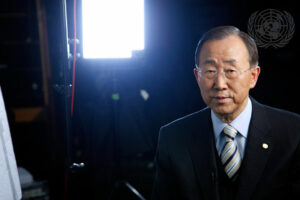ARTIFICIAL INTELLIGENCE (AI) can be harnessed to help achieve sustainable development goals (SDGs), though the risks could include bias and job displacement, former United Nations Secretary-General Ki-moon Ban said.
“In just a few short years, AI has evolved from a research concept into a powerful force now. It’s no longer research. It’s really acting now. It reshapes every corner of enterprises,” he said at the Asian Forum on Enterprise for Society on Tuesday.
“It has now become a technology (capable of) reasoning, creating, and collaborating with humans in real time,” he added.
In particular, he said enterprises now use AI to predict customer needs, personalize experiences, and make prompt decisions, with AI-driven analysis now guiding strategy in manufacturing, healthcare, and finance.
“As we look ahead, the next decade of enterprise will be defined by how well we balance capability with responsibility,” he said.
“AI is expected to bring immense opportunity for implementing SDGs but also poses profound challenges like bias, privacy, job displacement, and the need for new forms of digital governance and ethics,” he added.
However, he said that for companies to thrive, AI should not be viewed as a cost-saving tool but rather one that is “aligned with ethical principles and human values.”
“To lead in this era, business leaders must embrace a new mindset, one that combines technological literacy with moral imagination. The future enterprise is not only data-driven. It is human-centered, built on trust, transparency, and inclusiveness,” he said.
“In short, AI is not replacing us. It is redefining what it means to be productive, creative, and intelligent. The question is no longer whether enterprises will use AI, but how wisely and responsibly they will do so by exercising courage to overcome the risks,” he added.
Meanwhile, he said that the world will not be able to achieve sustainable development if it doesn’t let women participate.
“If we hold back half of the world’s population, who are women, it’s simply impossible. We cannot achieve a sustainable world as we have been promoting,” he said.
“To construct a sustainable future for all, we must synergize the skills, knowledge, partnership, and leadership of all women. So, we must use all these women’s capabilities,” he added.
He said that elevated solidarity between all stakeholders and leaders is needed to achieve SDGs.
“We can create the future we want, one that is anchored in sustainability, inclusion, and empowerment for all people and our planet,” he said.
“Unless we join all our hands… we will never be able to achieve our dreams, our visions of SDGs, climate change agreements, human rights, and women’s rights,” he added. — Justine Irish D. Tabile
